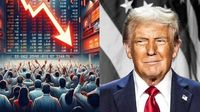As global markets reeled under the weight of sharp sell-offs, Indian indices experienced significant declines on Monday, April 7, 2025. The Nifty 50 plunged by 5.07% to close at 21,743.65, while the BSE Sensex fell by 3,939.68 points, settling at 71,425.01. This turmoil was largely triggered by escalating trade tensions following U.S. President Donald Trump's announcement of sweeping tariffs, which sparked retaliatory measures from China.
The sell-off marked one of the steepest declines in recent months, with India's Nifty and Sensex emerging as the second-best performing markets in Asia despite the widespread declines. The panic was palpable as the India VIX surged to 57.40%, indicating heightened volatility and fear among investors.
Reflecting on the broader market trends, the MSCI Asia Pacific Index plummeted by as much as 7.9%, its worst decline since the 2008 financial crisis. Hong Kong's Hang Seng index led the fall, crashing nearly 13%, while Japan's Nikkei 225 slid 8.84%. Other regional indices, including South Korea's KOSPI and Taiwan's Taiex, also suffered significant losses, with declines of 5.59% and 10%, respectively.
In contrast, Indian markets had shown relative resilience. On the previous trading session, the Nifty had only declined 1.69%, and the Sensex dropped 1.38%, far less than their Asian counterparts. "The ongoing trade tensions have rattled investor confidence, injecting extreme volatility into markets worldwide," said an analyst from a leading financial firm.
U.S. markets mirrored this global trend, experiencing a bloodbath as they opened on Monday morning. The Nasdaq, S&P 500, and Dow Jones indices all slumped between 4% and 5% shortly after the opening bell. Trump's reciprocal tariffs have led to a broad-based fall in financial markets globally, with investors fearing that these moves could raise inflation and risk economic growth.
In a post on his social media platform Truth, Trump addressed the American public, stating, "The United States has a chance to do something that should have been done DECADES AGO. Don't be Weak! Don't be Stupid! Don't be a PANICAN (A new party based on Weak and Stupid people!). Be Strong, Courageous, and Patient, and GREATNESS will be the result!" His comments, however, did little to assuage investor fears as the markets continued to tumble.
As the day progressed, Indian stocks witnessed a sharp decline, with the Sensex at one point dropping 5% lower. However, it managed to pare some losses, closing down 2,226 points. Similarly, the Nifty slipped 3% to close at 22,161.60 points. The decline in Indian indices was exacerbated by a massive Wall Street sell-off on Friday, where the Dow Jones Industrial Average fell 5.5% after a 4% drop the previous day.
The broader implications of these tariff announcements are concerning, with many analysts warning that a full-blown trade war could push the global economy into recession. Since the U.S. tariff announcement on April 2, 2025, Hong Kong's Hang Seng has lost 11.6%, Japan's Nikkei 225 is down 11.3%, and China's CSI 300 has dropped 7.8%. In comparison, India's Nifty 50 has shed just 1.8%, highlighting its relative strength amid global turmoil.
In the European markets, the situation was no better. The UK's FTSE 100 fell 6.4%, Germany's DAX lost 7.8%, and France's CAC 40 dropped 7.4%. The Euro Stoxx 50, representing major eurozone companies, declined by 8%, reflecting the pervasive fear and uncertainty gripping investors.
Despite the sharp losses on Monday, analysts suggest that India's comparatively moderate decline highlights its resilience in a region battered by fear and uncertainty. "While the global markets face significant pressure, India's fundamentals remain strong, and investors are advised to remain cautious but optimistic," said a senior market analyst.
As the trading week unfolds, all eyes will be on how the markets react to further developments in the U.S.-China trade relations, with potential implications for global economic stability. Investors are urged to stay informed and consider the broader economic indicators as they navigate this volatile environment.








